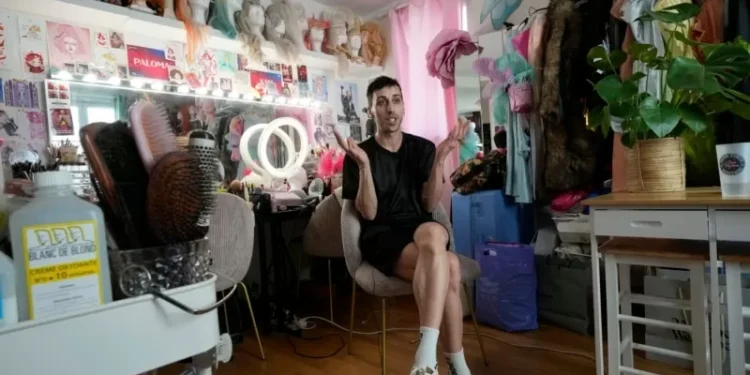Paris has always been known as a city of love, fashion, and art. But for many, it has also been a city that lacked representation and inclusivity. For Hugo Bardin, a gay youth growing up in central France, this was especially true. He never felt like he belonged in a world that did not represent who he truly was. However, all of that changed when he became a part of the Paris Olympics opening ceremony.
Bardin, who performs as the drag queen Paloma, was proud to be a part of a ceremony that showcased a multifaceted, multiethnic France with people of different ethnicities and orientations. It was a powerful and meaningful moment for not only the French people, but also for the representation of France around the world.
The opening ceremony, directed by Thomas Jolly, featured a scene that has drawn some criticism, including from US presidential candidate Donald Trump who called it “a disgrace.” The scene, which featured drag artists and dancers alongside popular DJ Barbara Butch wearing a silver headdress, has been interpreted by some as a mockery of Leonardo Da Vinci’s painting, “The Last Supper.”
But Paloma, best known for winning “Drag Race France,” and other participants have repeatedly stated that the scene was not inspired by “The Last Supper.” Instead, it was meant to celebrate community tolerance and showcase the diversity of France in 2024.
Despite the backlash and criticism, Paloma has no misgivings about being a part of the show. She is proud to have been a part of a ceremony that did not rely on tired French cliches, but instead presented a modern and inclusive image of France.
Many others agreed and praised the ceremony for its creativity, style, and showmanship. However, some French Catholic bishops and others have expressed their offense, claiming that Christians have been disrespected. Paris Olympics organizers have clarified that there was never an intention to show disrespect to any religious group, but to celebrate diversity and tolerance.
When asked about Trump’s comments on the scene, Paloma’s response was, “My first reaction is to say that if Donald Trump is not reacting, then we have not done our job.” She believes that the criticism has been fueled by hate and is hypocritical, as it goes against the messages of kindness and acceptance that religion preaches.
Paloma and others involved in the ceremony have been accused of trying to impose their vision on the world. But Paloma clarifies that their intention was never to impose, but to simply claim their place in the world and let people know that they exist and deserve to be represented.
In a phone interview and at her Paris workshop, a studio devoted to her drag performances, Paloma shared her thoughts on the backlash. She debuted her drag persona five years ago, taking inspiration from the films of Pedro Almodóvar.
When asked if she had any regrets about the scene, Paloma’s response was, “My only regret is people’s reactions. I’m sorry if people are offended, but we did not try to parody or mock ‘The Last Supper.’ It was not the point. So I can’t regret what I did. I’m sorry for people to only see things in a negative way.”
She urges people to change their perspective and try to see the beauty in what they did. Because in the end, it was all about beauty, reunion, and reparation.
The Paris Olympics opening ceremony was a momentous event that showcased the true diversity and inclusivity of France. It was a celebration of different cultures, orientations, and identities coming together in one place. And for Paloma, it was a proud moment to be a part of, representing a community that has often been overlooked and marginalized.
In a world where hate and discrimination still exist, events like the Paris Olympics opening ceremony serve as a reminder that love, acceptance, and unity are the values that truly matter. And for that, we should all be grateful to Paloma and others involved in the ceremony, for standing up and claiming their place in the world.









